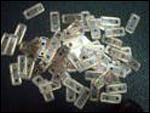Interviews
'RFID carries unconditional guarantee of success' - Study
07 Feb '09
17 min read

In the wake of the public consultation procedure, the EU now argues for the opting method in the retail trade with a further critical debate on this topic in 2011. Even though this recommendation from back in March 2008 is not legally binding on the EU member states, it nonetheless appears to constitute a preliminary decision in favour of opt-in in the retail trade.
The details show that the commercial success of RFID is influenced by many preconditions from the three areas of entrepreneurial environment, technology and politics. With these preconditions it becomes apparent that RFID is not a panacea for all business challenge. Contrary to some representations in the public debate there will continue to be a large number of application fields in which the RFID-based solution is not as good from a business standpoint as alternative solutions (especially ones based on the bar code or data matrix code).
Companies pinning big hopes on RFID:
Given the prominent examples of successfully implemented RFID projects and the broad public interest in RFID only two German businesses in five believe that RFID is generally unsuitable for their own field of business (see Figure 6). However, these assessments – which were captured in a survey, conducted by the Wissenschaftliches Institut für Informatik und Gesellschaft (IIG, a research institute focusing on information technology and society) of the University of Freiburg – strongly depend on the size of the company surveyed.
For while only about one big company in twelve says that RFID is unsuitable, the ratio among the small-to-medium-sized companies is nearly one in four – even though no RFID application is technically unsuitable a priori for small or medium structures. The companies that opt to use RFID pin big hopes on these projects. More than 70% of the companies surveyed hope that their investments will amortize themselves within 4 years. The efficiency gains achieved in most of the realized RFID projects hold considerable attraction for potential RFID users. The companies hope that the potential efficiency gains of the technology may also be realized in their own business environment.
RFID is a dynamic market:
As with many other technological innovations, more time will be needed to address the challenges of RFID than originally anticipated. There has been only limited progress on numerous issues over the past few years. Owing to the still unresolved challenges in the three areas of entrepreneurial environment, technology and politics, the market was unable to expand at the breakneck pace predicted by some research institutes only a few short years ago.
Nonetheless, considering the marked interest from the demand side we expect RFID suppliers to enjoy a generally positive environment. In this environment, global turnover is likely to increase by an average of 25% p.a. to a total of around EUR 16 bn between 2006 and 2016. In Germany alone, turnover is set to grow by 19% p.a. on average during this period, to EUR 2.2 bn. Considering the burgeoning growth of the market the share of revenues claimed by RFID tags is set to decline vis-à-vis the shares of readers and software, from nearly 50% of total revenues to just over 40% between 2006 and 2016.
The details show that the commercial success of RFID is influenced by many preconditions from the three areas of entrepreneurial environment, technology and politics. With these preconditions it becomes apparent that RFID is not a panacea for all business challenge. Contrary to some representations in the public debate there will continue to be a large number of application fields in which the RFID-based solution is not as good from a business standpoint as alternative solutions (especially ones based on the bar code or data matrix code).
Companies pinning big hopes on RFID:
Given the prominent examples of successfully implemented RFID projects and the broad public interest in RFID only two German businesses in five believe that RFID is generally unsuitable for their own field of business (see Figure 6). However, these assessments – which were captured in a survey, conducted by the Wissenschaftliches Institut für Informatik und Gesellschaft (IIG, a research institute focusing on information technology and society) of the University of Freiburg – strongly depend on the size of the company surveyed.
For while only about one big company in twelve says that RFID is unsuitable, the ratio among the small-to-medium-sized companies is nearly one in four – even though no RFID application is technically unsuitable a priori for small or medium structures. The companies that opt to use RFID pin big hopes on these projects. More than 70% of the companies surveyed hope that their investments will amortize themselves within 4 years. The efficiency gains achieved in most of the realized RFID projects hold considerable attraction for potential RFID users. The companies hope that the potential efficiency gains of the technology may also be realized in their own business environment.
RFID is a dynamic market:
As with many other technological innovations, more time will be needed to address the challenges of RFID than originally anticipated. There has been only limited progress on numerous issues over the past few years. Owing to the still unresolved challenges in the three areas of entrepreneurial environment, technology and politics, the market was unable to expand at the breakneck pace predicted by some research institutes only a few short years ago.
Nonetheless, considering the marked interest from the demand side we expect RFID suppliers to enjoy a generally positive environment. In this environment, global turnover is likely to increase by an average of 25% p.a. to a total of around EUR 16 bn between 2006 and 2016. In Germany alone, turnover is set to grow by 19% p.a. on average during this period, to EUR 2.2 bn. Considering the burgeoning growth of the market the share of revenues claimed by RFID tags is set to decline vis-à-vis the shares of readers and software, from nearly 50% of total revenues to just over 40% between 2006 and 2016.
Popular News
Leave your Comments
Editor’s Pick
































-Ltd..jpg?tr=w-120,h-60,c-at_max,cm-pad_resize,bg-ffffff)





.jpg?tr=w-120,h-60,c-at_max,cm-pad_resize,bg-ffffff)
.jpg?tr=w-120,h-60,c-at_max,cm-pad_resize,bg-ffffff)






